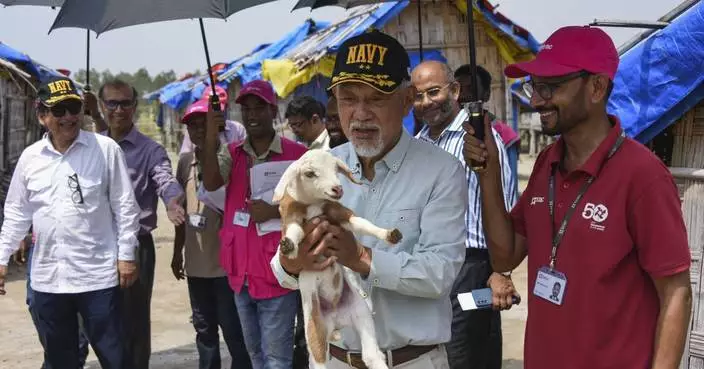Two human rights groups accused the U.N. Security Council on Tuesday of ignoring large-scale "ethnic cleansing" of Myanmar's Rohingya Muslims who are fleeing across the border to Bangladesh.
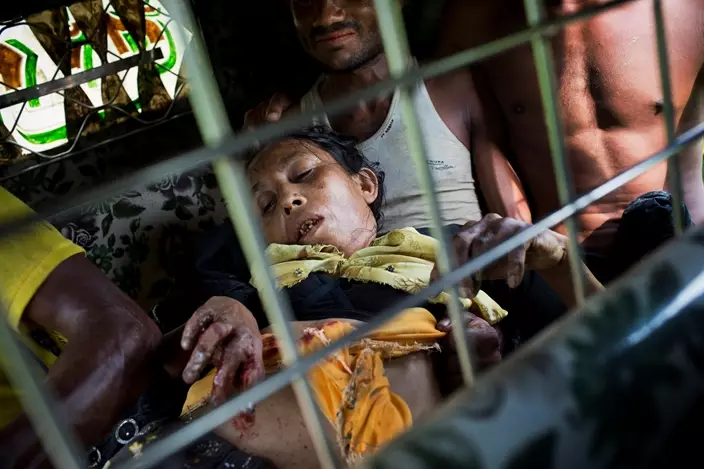
FILE - In this Sept. 4, 2017, file photo, an injured elderly woman and her relatives rush to a hospital on an autorickshaw, near the border town of Kutupalong, Bangladesh, after the Rohingya woman encountered a landmine that blew off the right leg while trying to cross into Bangladesh. (AP Photo/Bernat Armangue, File)
Human Rights Watch and Amnesty International representatives made the charge during a news conference held at U.N. headquarters ahead of closed council discussions Wednesday on the Myanmar crisis, saying they wanted to spotlight the failure of the U.N.'s most powerful body to demand an end to the violence being used by Myanmar to to chase out Rohingya.
U.N. officials have said 370,000 Rohingyas have fled from Myanmar to Bangladesh since Aug. 25 and thousands more are arriving every day.
Louis Charbonneau, the U.N. director for Human Rights Watch, said that "this is an international peace and security crisis," with people dying and villages burning. He said there is no excuse for the Security Council "sitting on its hands."
"The situation in Myanmar's northern Rakhine state was totally predictable," Charbonneau said. "The U.N. Security Council should have seen this coming long ago. We got a taste of it last year, on a smaller scale: killings, burnings of villages ... It's now much worse"
Echoing U.N. human rights chief Zeid Ra'ad al-Hussein, Charbonneau said, "This is ethnic cleansing on a large scale, it seems."
He said the United States and Sweden, both Security Council members, "have said some good things" but they need to push the council to hold an open meeting, demand an end to the killings, humanitarian access to the Rohingyas, and access for a fact-finding mission appointed by the U.N. Human Rights Council.
Russia and China, both veto-wielding permanent members, are supportive of Myanmar's government.
Tiran Hassan, Amnesty International's emergencies director, spoke by video from Cox's Bazar in southeastern Bangladesh where the Rohingyas have arrived in what she called "a sea of human misery."
She said "every day there are more horrors," including looking across the river at smoke rising from the Myanmar town of Maungdaw in Rakhine state.
"People are walking for days escaping what can only be described as widespread and systematic abuses," she said. "It is a campaign that is targeting the Rohingya," not a counterinsurgency operation as Myanmar's government claims.
Rohingya insurgents attacked police posts on Aug. 25, and Myanmar's military retaliated with what it calls "clearance operations" to root out rebels. The government's operations have included killings, disappearances and village burnings, refugees arriving in Bangladesh say.
"What we have seen in response to that attack ... is collective punishment targeting the Rohingya population," Hassan said. "We agree fully with the assessment of the human rights commissioner calling it ethnic cleansing, and it is textbook."
Human Rights Watch Deputy Director Akshay Kumar showed a map where satellite photos detected 21 fires between Aug. 25 and Sept. 4, including in Maungdaw where 450 buildings that were standing on Jan. 30 were shown destroyed on Sept. 2. She said Myanmar is "being emptied" of its Rohingya population.
BANGKOK (AP) — Myanmar’s military has begun basic training at military bases and schools across the country for draftees called up under the country’s recently activated conscription law, state-run media reported on Tuesday.
The authorities activated the conscription law in February in a bid to to replenish the ranks that have been depleted in nationwide battles against ethnic minority armed groups and armed pro-democracy resistance forces opposed to military rule. The struggle began when the army seized power from the elected government of Aung San Suu Kyi in February 2021.
Over the past five months, the army has lost territory in northern Shan state and in Rakhine state in the west, and is under growing attack elsewhere. It appeared this week that it may also lose the important trading town of Myawaddy, in Kayin state on the border with Thailand.
Opening ceremonies for training were held in various regional commands and military schools in Mon and Shan states and Tanintharyi, Magway and Mandalay regions, as well as in the capital, Naypyitaw, the state-run Myanma Alinn newspaper reported Tuesday.
It said the first batch of trainees were those who voluntarily reported to the army after the military government sent letters summoning them.
The conscription law’s activation has created fear, anxiety and defiance among young people and their parents. Some are leaving the country, while others are fleeing into border areas controlled by ethnic minorities or joining resistance groups.
Independent Myanmar media reported Tuesday that a few young people staged brief protests against conscription at three locations in Yangon, the country’s largest city. The protests on Monday were carried out as flash mobs to evade attacks or arrests by the authorities.
Under the law, men aged 18 to 35 and women 18 to 27 can be drafted into the armed forces for two years. The military has said about 14 million men and women of the total 56 million population of the country are eligible for military service and it will draft 5,000 people at a time and up to 60,000 people a year. Evading conscription is punishable by three to five years in prison and a fine.
Myanmar’s military is also reportedly tapping an unlikely source to fill its depleted ranks, turning to members of the the Muslim Rohingya minority, who seven years ago were the targets of a brutal counterinsurgency campaign incorporating rape and murder that saw an estimated 740,000 flee to neighboring Bangladesh as their villages were burned down.
Analysts say the move is meant not only to counter the army’s attrition though deaths, desertions and defections, but also constitutes a divide and conquers strategy meant to reignite tensions between ethnic groups in Rakhine.
Rohingya have lived especially in Rakhine for generations, but they are not officially recognized as an indigenous ethnic minority, instead being called Bengalis and described as illegal immigrants. They have been denied citizenship and other basic rights including freedom of movement, and are the targets of widespread social discrimination. The U.N. has estimated that 600,000 Rohingya are still living in Myanmar.
The main anti-military resistance force in Rakhine state is the Arakan Army, which is part of the movement seeking greater autonomy for the Rakhine ethnic group that dominates the area. Rakhine nationalists were among the leading persecutors of the Rohingya minority, but now the Arakan Army and the Rohingya have a common enemy in the military government to took power in 2021, making them uneasy allies.
Aung Kyaw Moe, a Rohingya who is deputy minister for human rights in the shadow National Unity Government, said last month that the military is creating a conflict between the Rohingya and Rakhine ethnic groups in hopes of regaining the military advantage in Rakhine.
“The military council is losing the battles nationwide. Especially in Rakhine, military camps are being abandoned almost every day, and the towns controlled by the military council are falling. In Rakhine, the military council is in need of a lot of human resources due to the depletion of the army. It seems that they have calculated that only by creating a conflict between Rakhine and Rohingya can the current situation be changed,” Aung Kyaw Moe said.
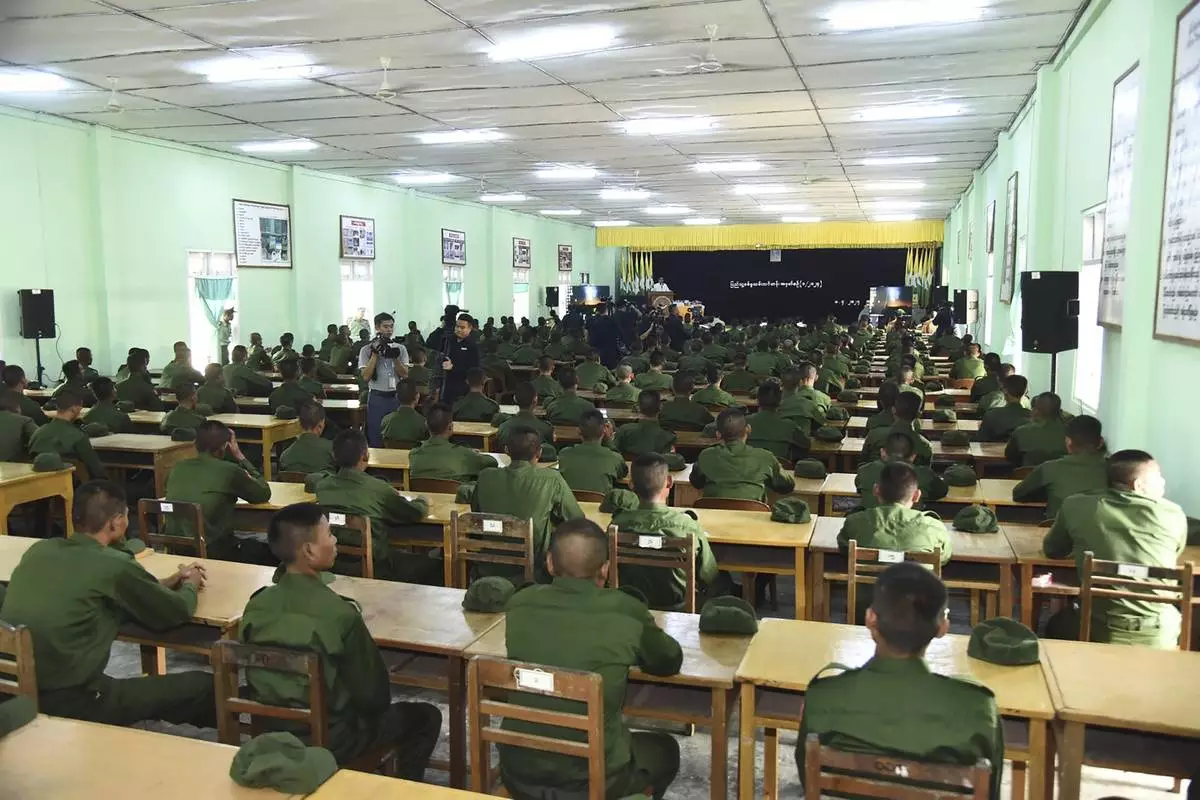
In this undated photo released on April 8, 2024 by The Military True News Information Team, trainees of first batch of military service attend an opening ceremony for their training session at a military compound in Mandalay, Myanmar. Myanmar’s military has begun basic training at military bases and schools across the country for draftees called up under the country’s recently activated conscription law, state-run media reported on Tuesday, April 9.(The Military True News Information Team via AP)
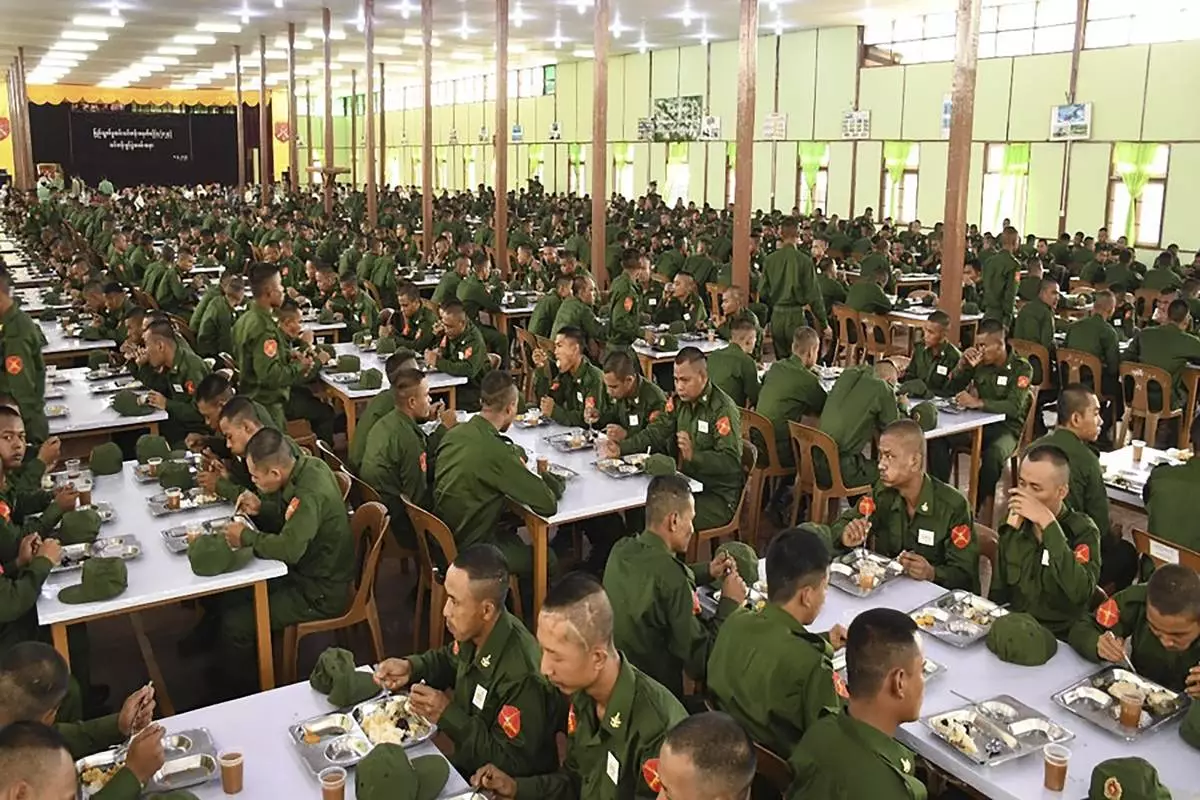
In this undated photo released on April 8, 2024, by The Military True News Information Team, trainees of first batch of military service have meals as an opening ceremony for their training session was held at a military compound in Yangon, Myanmar. Myanmar’s military has begun basic training at military bases and schools across the country for draftees called up under the country’s recently activated conscription law, state-run media reported on Tuesday, April 9.(The Military True News Information Team via AP)
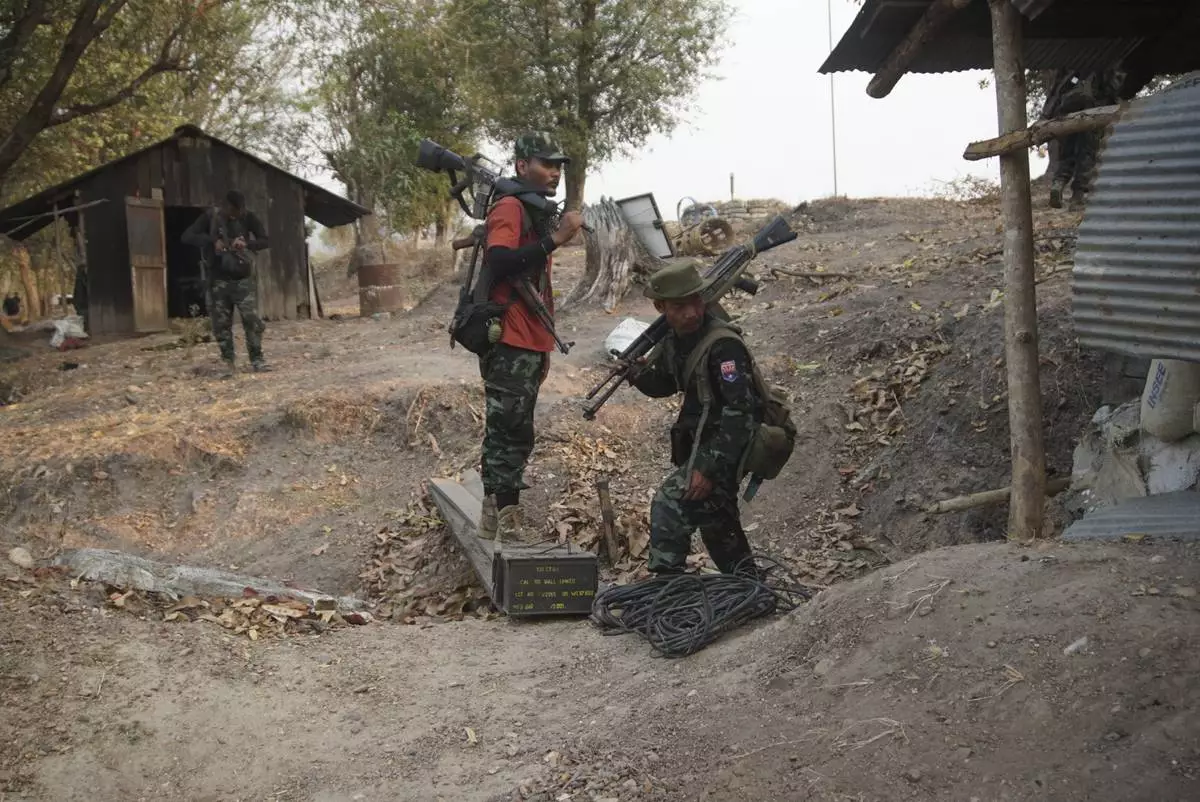
Members of the Karen National Liberation Army and People’s Defense Force collect weapons after they captured an army outpost, in the southern part of Myawaddy township in Kayin state, Myanmar, March 11, 2024. (AP Photo/METRO)
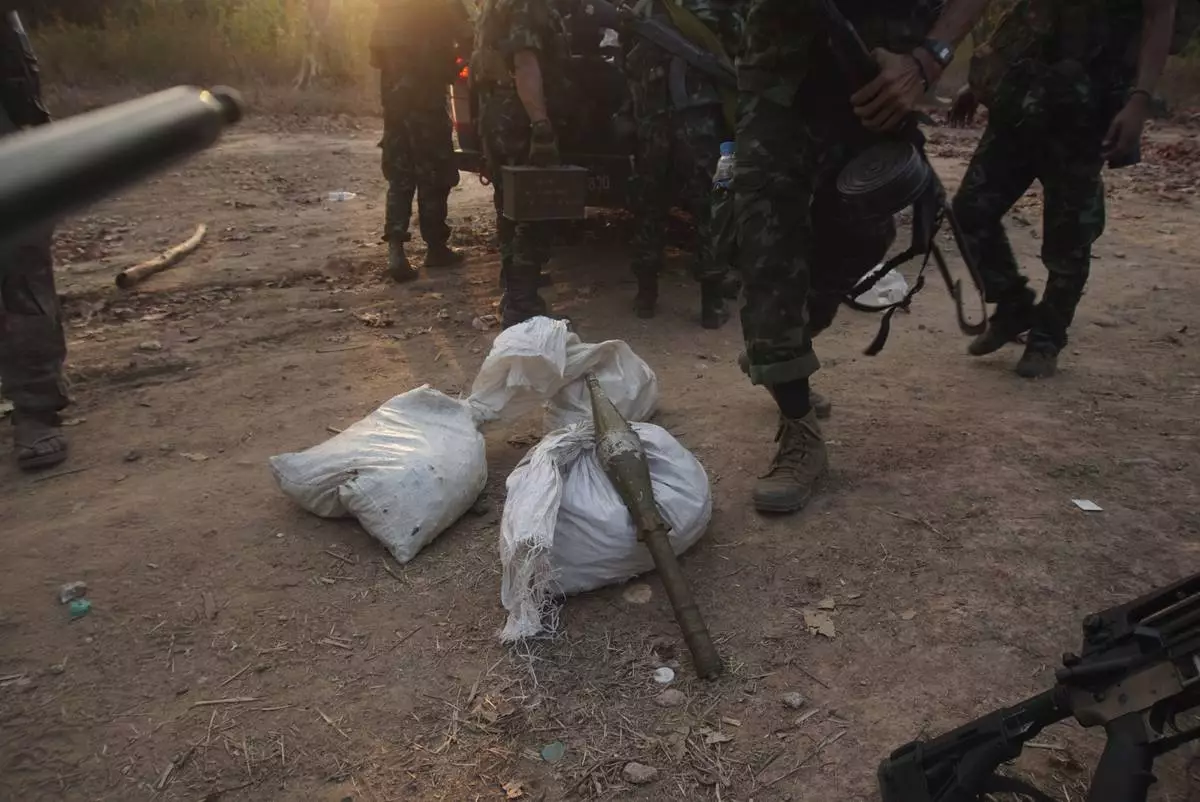
Members of the Karen National Liberation Army and People’s Defense Force collect weapons after they captured an army outpost, in the southern part of Myawaddy township in Kayin state, Myanmar, March 11, 2024. (AP Photo/METRO)
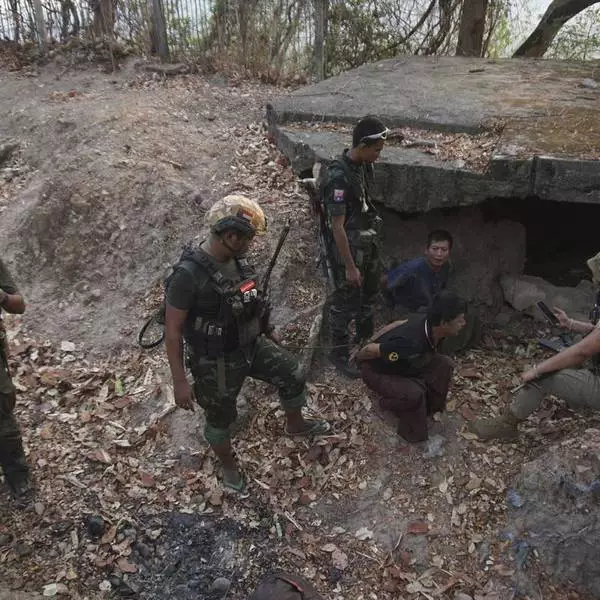
Myanmar military begins basic training for draftees as resistance forces keep the pressure on
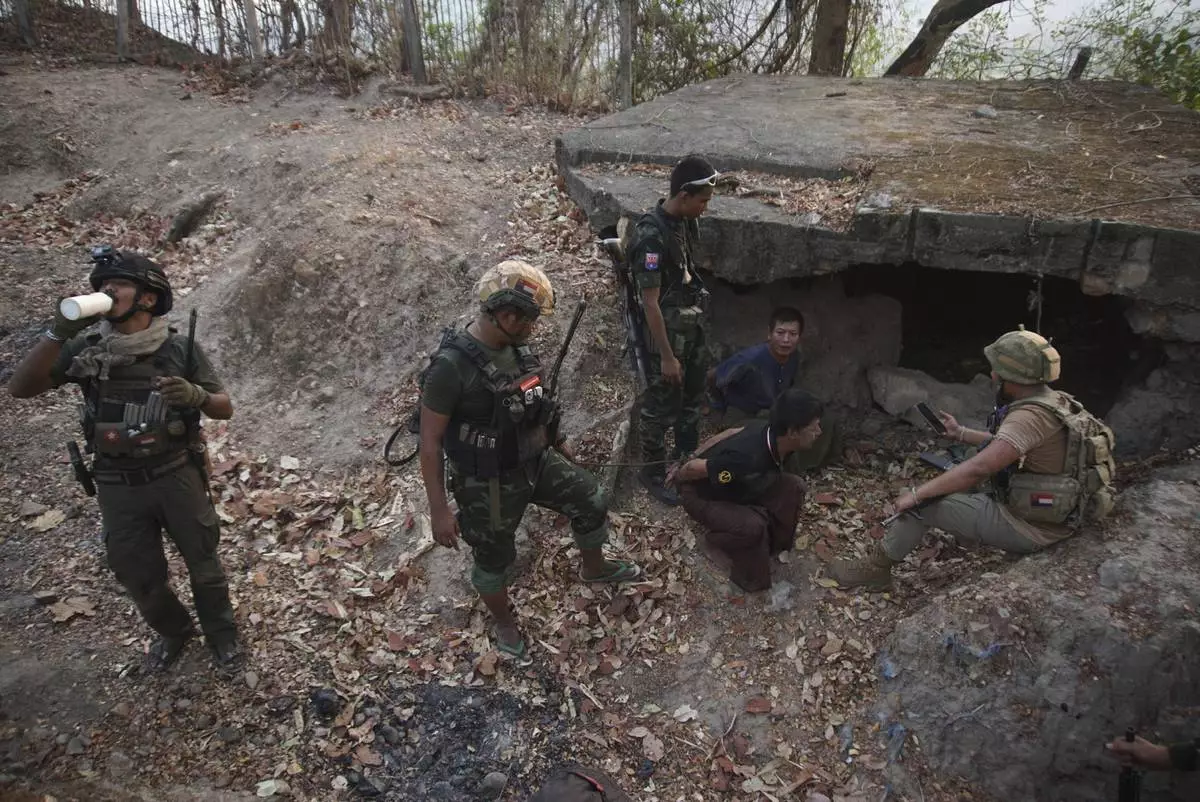
Members of the Karen National Liberation Army and People’s Defense Force examine two arrested soldiers after they captured an army outpost, in the southern part of Myawaddy township in Kayin state, Myanmar, March 11, 2024. (AP Photo/METRO)
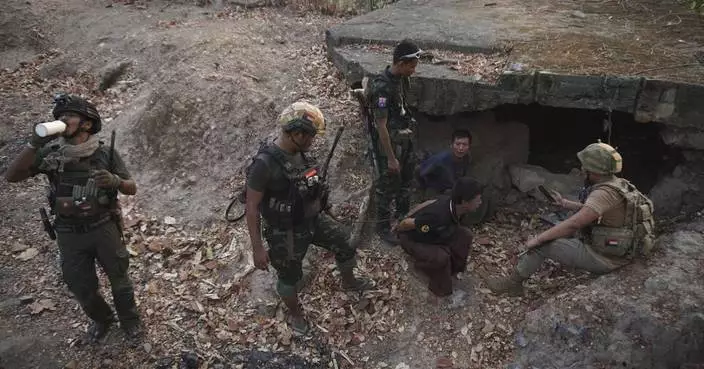
Myanmar military begins basic training for draftees as resistance forces keep the pressure on











